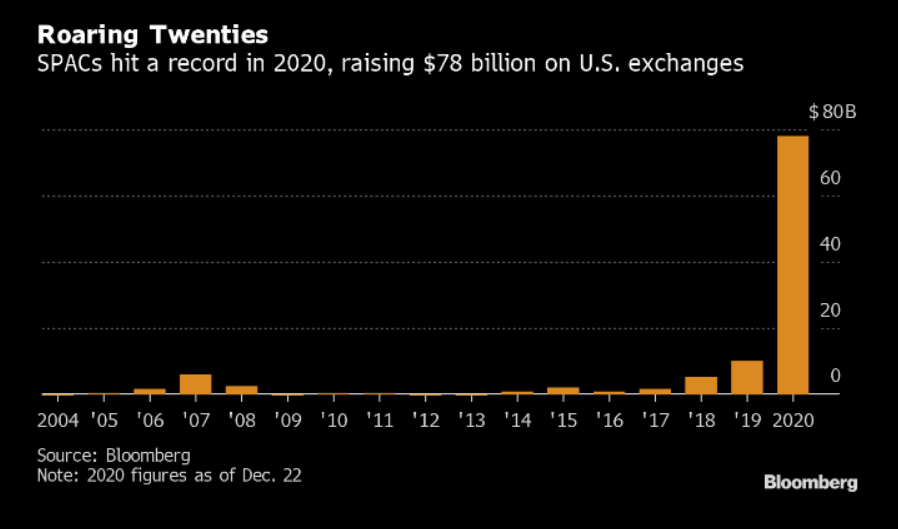Yes indeed, 2020 was an unusual (aka, dreadful) year. Covid-19 (which almost killed me), the Porkulus Bill (Covid bill combined with Omnibus spending bill) $900 billion coronavirus relief bill and $1.4 trillion government funding measure slipped through Congress with few reading it, watching sports on TV with almost none one in attendance, the Buffalo Bills in first place, etc. Now we have the SPAC revolution.
(Bloomberg) — There are four letters that sum up 2020’s equity market: S-P-A-C.
Special purpose acquisition companies, or SPACs, went from a back-of-the-shelf financial vehicle to one of the biggest segments of initial public offerings, with a record $78 billion raised in the U.S. this year, according to data compiled by Bloomberg. That exceeded the combined total of SPACs in all previous years and made up about 45% of this year’s record $177 billion IPO volume, the data show.
Blank-check companies, as SPACs are also known, will continue to shake up not only equity markets but also mergers and acquisitions in 2021, dealmakers predict. Still, the flood of SPACs searching for acquisition targets — plus the new ones being raised every day trying to woo investors — could create a challenging dynamic.
“I still think it’s going to be a very, very robust market in 2021,” said Niron Stabinsky, Credit Suisse Group AG’s head of SPACs. “ECM volumes are incredible, which is a function in part of the strong performance of the equity markets in general. At some point it is inevitable that things will cool down and you will see volume slow.”
Credit Suisse alone is preparing to launch seven to eight new SPACs in January, he added.
Credit Suisse was the No. 1 SPAC underwriter, followed closely by Citigroup Inc., while Goldman Sachs Group Inc. was the top adviser on mergers involving SPACs, according to data compiled by Bloomberg.
The unprecedented surge in SPACs was fueled in part by a hunt for alternative investments that was spurred by the coronavirus pandemic. It also sprung from a renewed debate over whether the traditional IPO process left money on the table for companies going public. Direct listings had emerged as one way to address that concern, but SPACs became the resounding answer in 2020.

But don’t worry. Wall Street still has IPOs. Particularly for Chinese firms.

NASDAQ has a nice summary of SPACs.

